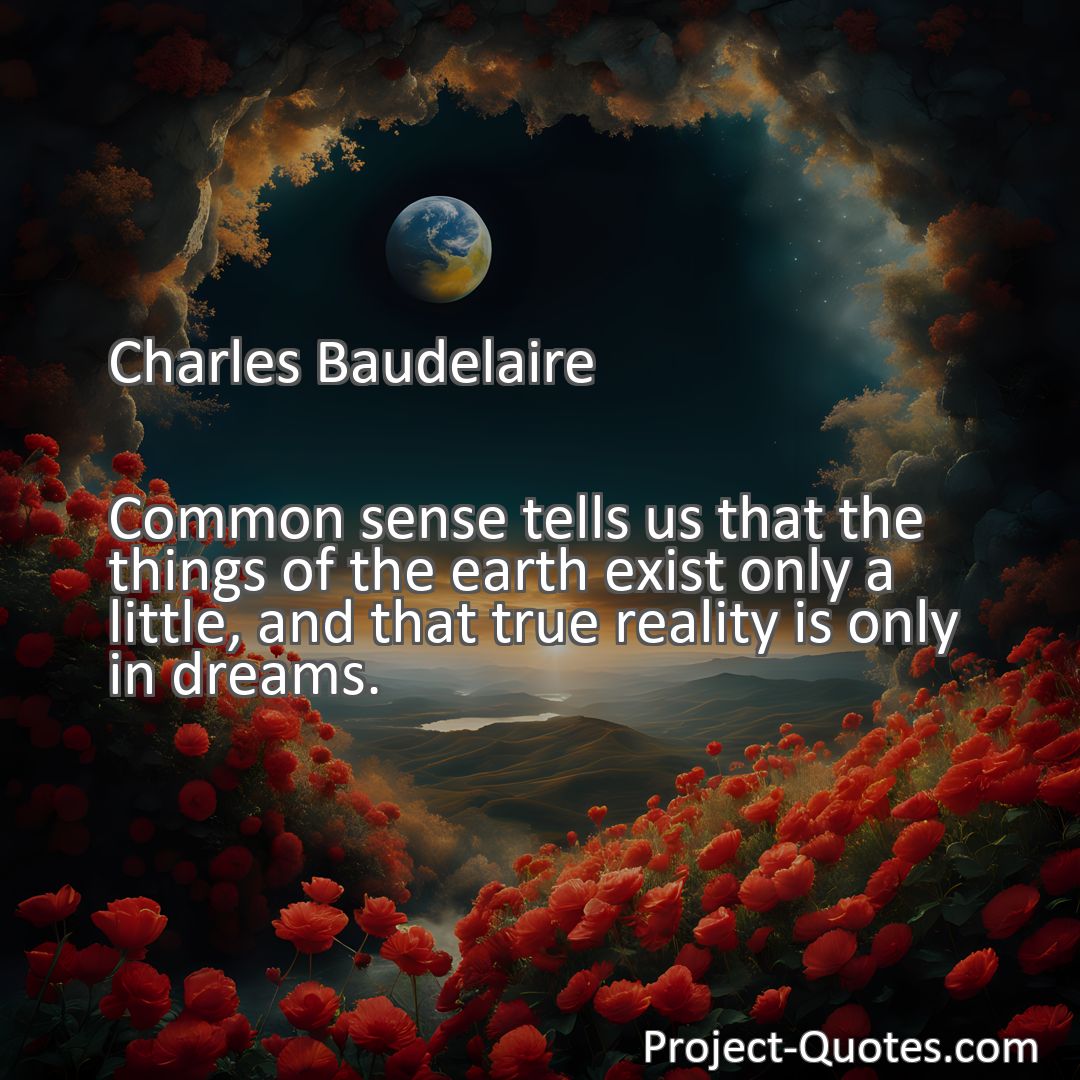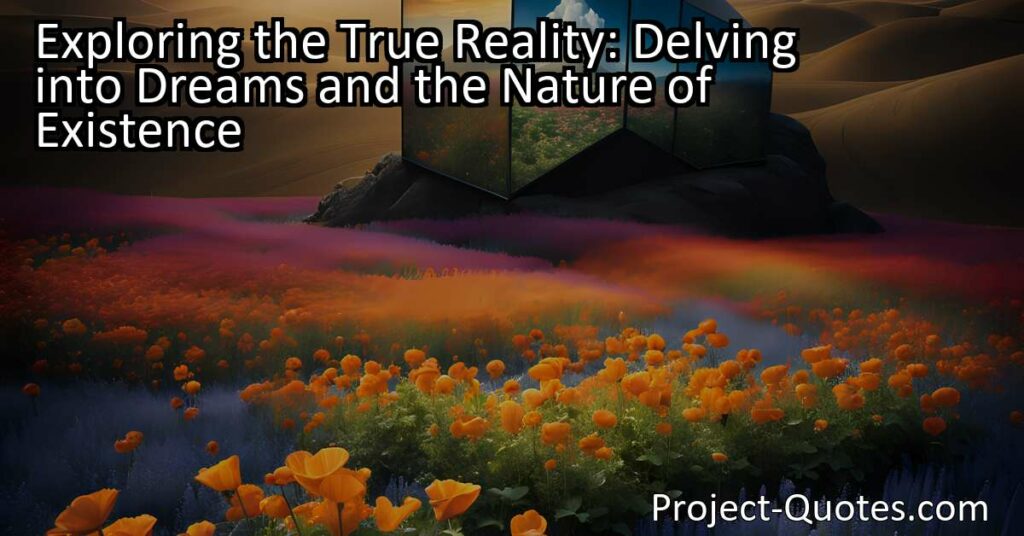Common sense tells us that the things of the earth exist only a little, and that true reality is only in dreams.
Charles Baudelaire
Exploring the True Reality: Delving into Dreams and the Nature of ExistenceCharles Baudelaire challenges the notion of reality by suggesting that true reality lies within our dreams. This thought-provoking idea prompts us to question our everyday experiences and consider the profound truths that dreams may hold. From a philosophical, literary, and scientific perspective, this article delves deeper into the interplay between dreams and reality, encouraging us to embrace the mysteries of existence and explore the hidden truths that await us in the realm of dreams.
Table of Contents
- 1 Common sense tells us that the things of the earth exist only a little, and that true reality is only in dreams.
- 2 Charles Baudelaire
- 3 Meaning of Quote – Common sense tells us that the things of the earth exist only a little, and that true reality is only in dreams.
- 4 Freely Shareable Quote Image
- 5 Related
Meaning of Quote – Common sense tells us that the things of the earth exist only a little, and that true reality is only in dreams.
Have you ever wondered about the nature of reality? Charles Baudelaire, a renowned French poet, once said, “Common sense tells us that the things of the earth exist only a little, and that true reality is only in dreams.” This thought-provoking quote challenges us to explore the idea that the world we perceive with our senses may not be the ultimate reality, while suggesting that the realm of dreams holds profound truths. In this article, we will delve deeper into Baudelaire’s words and ponder the concept of reality from a philosophical and literary perspective. So, let your imagination roam free as we embark on a journey through the evocative landscapes of dreams and the enigmatic realm of reality.
When we think of common sense, we usually associate it with practical and logical thinking based on our everyday experiences. According to Baudelaire, common sense implies that the physical world, the “things of the earth,” is fleeting, temporary, and limited in its existence. From this perspective, one might argue that our sensory perception deceives us by presenting an illusion of stability and permanence, shielding us from the true nature of reality. Baudelaire posits that we ought to turn to our dreams to discover what lies beyond this illusory veil, as dreams are believed to offer glimpses into a deeper reality that we cannot access in our waking lives.
Dreams have long fascinated humanity, captivating our minds with their surreal landscapes and bizarre narratives. They bring us an array of emotions, from joy to fear, and often leave us pondering their meaning upon waking. Just think about the most vivid or peculiar dream you have had it might have felt so real that you questioned whether you had truly left the realm of wakefulness. Baudelaire suggests that these dream experiences are more than mere illusions or subconscious musings; rather, they provide us with a unique insight into a profound reality that lies outside the bounds of our waking existence.
Throughout history, philosophers and writers alike have grappled with the concept of reality and the significance of dreams. Baudelaire’s quote aligns with various philosophical and literary traditions that explore the nature of existence. For instance, in ancient philosophy, the allegory of Plato’s Cave suggests that our perception of reality is like shadows cast on a cave wall, obscuring the true forms and ideas that constitute ultimate reality. In this allegory, the cave dwellers mistake these shadows for the real world, just as Baudelaire suggests that common sense deceives us by confining us to the superficial world of sensory perception.
Moreover, Baudelaire’s words resonate with the Romantic movement, which flourished in the 19th century. Romanticism celebrated the power of imagination, emotion, and the supernatural, often emphasizing the discrepancy between the real and the ideal. The Romantics sought to transcend the limitations of common sense and explore the depths of the human psyche through various means, including dreams. Writers such as Edgar Allan Poe and Mary Shelley embraced the mysterious, the uncanny, and the dreamlike in their works, giving validity to Baudelaire’s claim that true reality resides in the realm of dreams.
In addition to the philosophical and literary traditions, science has also contributed to our understanding of the intricate relationship between dreams and reality. With advancements in neurology and psychology, researchers have been able to shed light on the mechanisms of dreaming and its potential significance. Dreams are now believed to be intimately connected to memory consolidation, emotional processing, and problem-solving abilities. Furthermore, studies have shown that dreams can reveal subconscious desires and fears, giving us a glimpse into our innermost selves. The science of dreams, therefore, aligns with Baudelaire’s assertion that dreams hold a truth that is absent from our waking experiences.
While dreams offer us a unique perspective on reality, it is essential to acknowledge that reality itself is a multifaceted concept. Our everyday experiences, though limited by our senses, shape our understanding of what is real. The physical world, despite its transience, still holds significance in our lives. It is where we form connections with others, where we experience joy, pain, and everything in between. Reality, therefore, cannot be solely confined to the realm of dreams. Instead, it is the interplay between the tangible and the intangible, the visible and the invisible, that defines our existence.
Ultimately, Baudelaire’s quote challenges us to question our assumptions about reality and encourages us to look beyond the surface of things. By exploring the landscapes of dreams, we can tap into a deeper understanding of ourselves and the world around us. Dreams, with their symbolism and hidden meanings, serve as a portal to unrestrained creativity and introspection. They allow us to break free from the constraints of our waking lives and venture into the realm of possibilities.
In conclusion, Charles Baudelaire’s quote invites us to reconsider the nature of reality and urges us to look beyond the ordinary. By suggesting that the things of the earth exist only superficially and that true reality lies within dreams, Baudelaire challenges conventional wisdom and encourages us to explore the depths of our imagination. Whether we find truth solely in dreams or believe in a more complex interplay between dreams and reality, Baudelaire’s words remind us to embrace the mysteries of existence and cherish the insights that our dreams offer us. So, the next time you drift off to sleep, don’t be afraid to dive into the world of dreams and discover the hidden truths that await you there.
I hope this quote inspired image brings you hope and peace. Share it with someone who needs it today!


